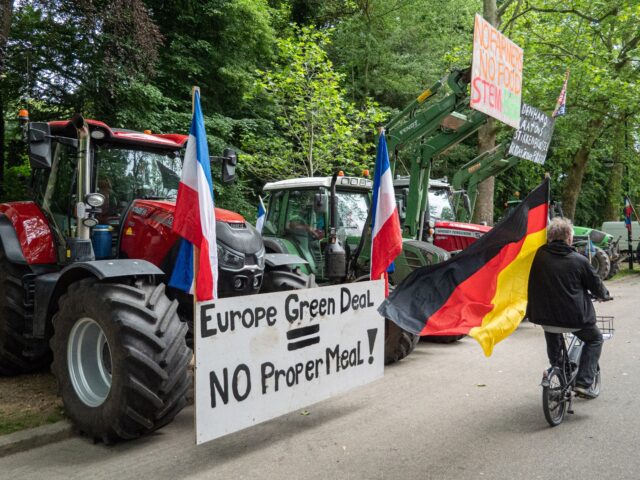The European Union narrowly approved the controversial green deal Nature Restoration Law on Monday, sparking condemnation from farmers’ organisations who fear it will further undermine their ability to feed the continent and make a living.
A vote on the Nature Restoration Law at a meeting of the EU’s Council of Ministers in Luxembourg passed by the “slimmest margin” possible as 20 countries, representing 66 per cent of the population of the bloc surpassed the needed qualified majority threshold of 65 per cent and therefore passed the long-delayed green deal legislation into law.
The law aims to see EU countries “restore” at least 30 per cent of natural habitats to good condition by 2030 and 90 per cent by 2050, Euractiv reports.
Farmers, who have staged large-scale tractor protests in opposition to the green agenda favoured by elites in Brussels have warned that this will result in massive swaths of arable farmland blocked off, endangering the livelihoods of farmers and threatening the food security of Europe.
The green legislation was also opposed by countries such as Finland, Italy, Hungary, the Netherlands, Poland, and Sweden. The approval of the law came on Monday as Austrian Environment Minister Leonore Gewessler made a last-minute U-turn to back the move.
“This law is pivotal to combat climate change. We need to ensure legal certainty for people using soil and land. We asked member states to give the possibility to work on various points on how to implement it,” she said per Euronews.
Gewessler’s decision to approve the act comes with some controversy, however, with Austrian Chancellor Karl Nehammer saying that she did not consult the government before voting and that the climate minister was “not entitled to commit” the country to backing the legislation. The national Austrian government, therefore, may launch legal action to overturn the vote.
LTO, one of the leading farmers’ organisations in The Netherlands, where the tractor protest uprising against the EU green agenda began in earnest in 2019, said that they were “concerned and indignant” over the passage of the Nature Restoration Act.
The Dutch farmer group criticised the bill for putting further financial demands on the agriculture sector, which has already laboured under heavy green regulations both at the national and EU levels and has been suffering with the energy crisis sparked by the coronavirus lockdowns and the Russian war in Ukraine.
They went on to note that the EU also failed to lay out exactly how farmers and others would be financially provided for, with the bill giving Brussels a year after the law is enacted to finalise subsidies. LTO said: “This is unacceptable. Before legislation comes into force, the financial feasibility/coverage must be known.”
Additionally, they criticised the bill for failing to accurately weigh the costs, arguing that the EU only estimated the costs to governments, while the majority of the costs would be imposed on farmers. LTO cited an assessment from the Dutch government which found that the costs of the green project for the Netherlands, alone would amount to around 76 billion euros by 2050, largely borne by farmers.
The European farming group Copa-Cogeca added that “the lack of clear and consistent funding for ecosystem restoration across the EU remains unanswered partly explaining the great embarrassment and headlong rush that surrounds this law. In this regard, we missed this morning the only chance to make this text implementable and acceptable on the ground.”
The passage of the green agenda legislation will likely result in more tractor protests in Europe. Ahead of the EU Parliament elections — which saw the Dutch pro-farmer BBB party gain seats for the first time — farmers groups vowed to return to their tractors following the autumn harvest if Brussels failed to address their concerns.

COMMENTS
Please let us know if you're having issues with commenting.